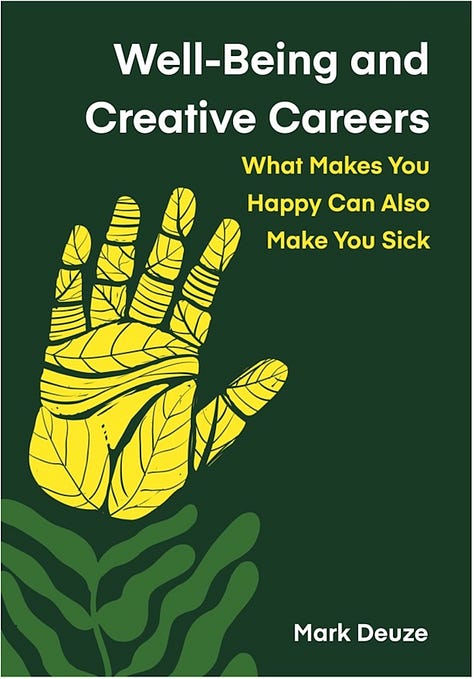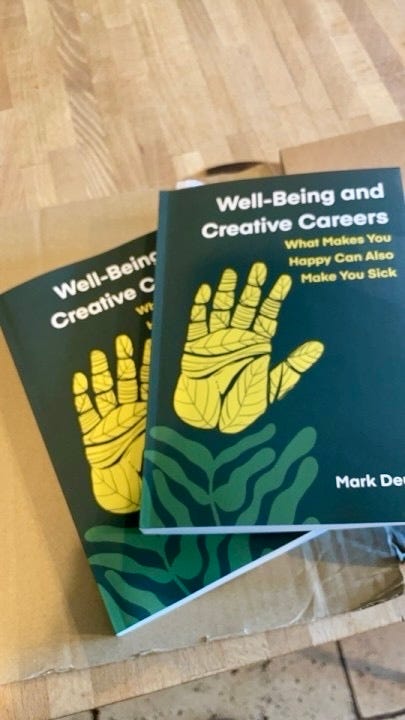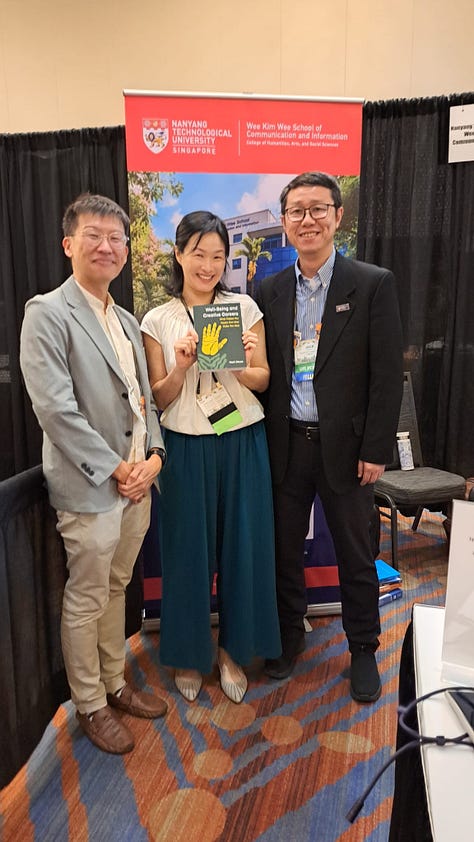Key Takeaways from Well-Being and Creative Careers Book
In preparation for a series of media industry talks, here are some key takeaways from the research on health and well-being in creative careers.
My forthcoming book Well-Being and Creative Careers (out in September 2025 with Intellect Books internationally, distributed by The University of Chicago Press) is an empirically grounded exploration of the health and well-being crisis in media, cultural and creative industries. With a cross-sectoral focus—including journalism, advertising, PR, marketing, music and recording, digital games, film/TV, and content creation—in the research I combine sociological inquiry, production studies, and insights from occupational medicine to interrogate the paradox at the heart of creative labor: why the very passion that drives people into creative careers often becomes the source of their suffering.
The subtitle of the book summarizes my central thesis: what makes you happy can also make you sick. It addresses a seemingly incompatible issue that illuminates creative work: doing what you love—long hailed as the ultimate career ideal—is as much a source of joy as it is of distress. This tension is magnified by precarious working conditions, exploitative industry norms, and the emotional self-investment demanded by creative labor (and eagerly exploited by its industries).



Key Takeaways for Creative Professionals
The Mental Health Crisis is Real—and Growing
Media workers face rising rates of burnout, anxiety, and depression. Surveys by industry groups reveal that excessive workloads, job volatility, and toxic work cultures are among the top stressors. The pandemic accelerated these pressures, but they are structural and persistent.Passion Fuels Exploitation
Creative professionals often internalize the ethic of “doing what you love” to the point of self-exploitation. Practitioners may overcommit, normalize long (unpaid) hours, and blur boundaries between life and work, all while being grateful to “have a seat at the table” and for the chance to turn their creativity into a career.Well-Being Requires Structural Support
While many studios, newsrooms and agencies now offer individual-level interventions (e.g., yoga, mental health apps, free pizza, the odd counseling session), the research underscores that these (can) mask deeper structural issues: poor management, inequitable pay, lack of diversity, and unclear boundaries between work and self.AI and Digital Transformation Are Double-Edged Swords
AI intensifies pressures on media professionals by:
Accelerating expectations (constant output, 24/7 engagement).
Fueling algorithmic anxiety, especially among dedicated professionals such as social media managers and content creators.
Eroding control and autonomy, as machine-learning systems shape everything from audience targeting to creative direction.
Blurring boundaries, as to engage authentically online means commodifying one’s personal (and private) life.
Yet AI also offers opportunities:
Delegation of rote tasks, freeing up time for strategic and meaningful work.
Data-driven personalization, potentially enhancing campaign impact.
The challenge lies in integrating AI without further eroding the mental and emotional autonomy of creative workers.Engage in fundamental reflection, as the power of (generative) AI and the digital environment forces creatives to return to key questions about what the purpose and motivation is for storytelling and creative work.
Love Your Work—But Demand That It Loves You Back
In conclusion, I call for a reframing of what it means to love one’s job. Love should be reciprocal. This means creating work environments that are psychologically safe, equitable, diverse, and supportive—not merely passionate and productive.
Forward-Looking Implications
For Industry Leaders: Develop policies that move beyond well-being as an HR checkbox. Empower workers and teams with autonomy, clarity, and community. Encourage transparency around workloads, set realistic expectations around digital availability, and rethink performance metrics to include worker well-being.
For Educators and Trainers: Future professionals entering creative fields must be equipped not only with technical skills and industry know-how, but also with mental health literacy and critical awareness of labor conditions and worker rights.
For Creative Professionals: Recognize signs of burnout and learn to disentangle self-worth from job performance. Advocate for yourself and your peers. Collective care, collaborative allyship and open dialogue can resist the cultural norm of silent suffering (given the remaining taboo, stigma and discomfort around mental health and well-being at work).
Final Note
This book is intended not just for students and researchers, but is written with the goal of helping anyone navigating the complexities of the creative industries. Hopefully I have been able to elevate well-being from a private concern to a collective imperative. Fundamentally, it is not about all the problems plaguing creative careers, as it is intended to be hopeful guide to a more humane future of (media) work.
Note: parts of this text come from a prompt to ChatGPT, asking it to provide a synopsis of my book intended for industry audiences, as I am preparing a series of talks and workshops in the field. For what it is worth: I am profoundly aware of the problematic aspects of using AI for creative purposes, both from an ethical as well as an environmental perspective.





Thanks for sharing. Looking forward to reading the book!